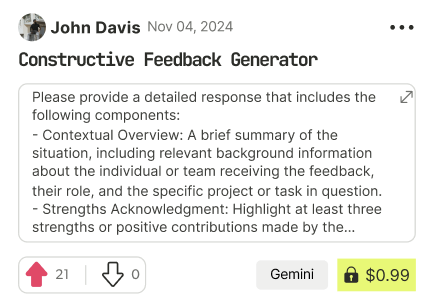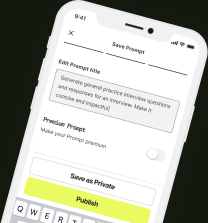prompt mine App
Find, Create & Share AI Magic
Personalized Learning Curriculum Designer
Okay, let's create a personalized learning curriculum for a student interested in **Programming in Python**. We'll assume the student is a **beginner** with no prior programming experience and design a **3-month** curriculum.
**Subject:** Programming in Python
**Student Level:** Beginner
**Total Duration:** 3 Months (approximately 12 weeks)
**Prerequisites:**
* Basic computer literacy (using a computer, navigating files, using a web browser).
* Willingness to learn and dedicate time to practice.
**Learning Objectives:**
By the end of this curriculum, the student will be able to:
* Understand fundamental programming concepts such as variables, data types, operators, control flow (if/else, loops), and functions.
* Write basic Python programs to solve simple problems.
* Work with common data structures like lists, dictionaries, and strings.
* Read and understand existing Python code.
* Debug and fix errors in their own code.
* Understand the basics of object-oriented programming (OOP) with Python.
* Utilize common Python libraries for specific tasks (e.g., working with dates, files).
* Build a few small, practical Python projects.
**Course Outline:**
| **Module** | **Topic** | **Timeframe** | **Resources** | **Assignments/Projects** | **Assessment** |
| :-------- | :-------------------------------------- | :------------ | :------------------------------------------------------------------------------------------------------------------------------------------------------------------------------------------------------------ | :----------------------------------------------------------------------------------------------------------------------------------------------------------------------------------------------------------------------------------------------------------------------------------------------------------------------------------------------------------------------------------------------------------------------------------------------- | :------------------------------------ |
| **1** | **Introduction to Python & Setup** | 1 Week | * Textbook: "Python Crash Course" by Eric Matthes (Chapter 1-2) * Online Course: "Python for Everybody" by Dr. Charles Severance (Coursera) - Week 1-2 * Anaconda Installation Guide | * Set up a Python development environment (Anaconda distribution recommended). * Write a simple "Hello, World!" program and run it. * Explore the Python interpreter (REPL). | * Code Submission: "Hello, World!" |
| **2** | **Variables, Data Types, and Operators** | 2 Weeks | * Textbook: "Python Crash Course" by Eric Matthes (Chapter 3-5) * Online Course: "Python for Everybody" by Dr. Charles Severance (Coursera) - Week 3-4 * Python Documentation on Data Types | * Practice declaring and using variables of different data types (integers, floats, strings, booleans). * Perform arithmetic operations using Python. * Practice using comparison and logical operators. * Write a program that calculates the area of a rectangle based on user input. | * Quiz: Variables & Operators |
| **3** | **Control Flow: If/Else & Loops** | 2 Weeks | * Textbook: "Python Crash Course" by Eric Matthes (Chapter 6-7) * Online Course: "Python for Everybody" by Dr. Charles Severance (Coursera) - Week 5-6 * Python Documentation on Control Flow Statements | * Write programs that use `if`, `elif`, and `else` statements to make decisions. * Implement `for` and `while` loops to iterate through data. * Write a program that determines if a number is prime. * Write a program that calculates the factorial of a number using a loop. * Create a simple number guessing game. | * Code Submission: Prime Checker |
| **4** | **Functions** | 2 Weeks | * Textbook: "Python Crash Course" by Eric Matthes (Chapter 8) * Online Course: "Python for Everybody" by Dr. Charles Severance (Coursera) - Week 7-8 * Python Documentation on Functions | * Define and call functions with parameters and return values. * Understand the concept of scope (local vs. global variables). * Write a function that calculates the average of a list of numbers. * Write a function that checks if a string is a palindrome. * Refactor previous assignments to use functions to improve code organization and reusability. | * Code Submission: Palindrome Checker |
| **5** | **Data Structures: Lists and Dictionaries** | 2 Weeks | * Textbook: "Python Crash Course" by Eric Matthes (Chapter 3, 6) * Online Course: "Python for Everybody" by Dr. Charles Severance (Coursera) - Week 9-10 * Python Documentation on Lists and Dictionaries | * Create, access, and modify lists and dictionaries. * Iterate through lists and dictionaries using loops. * Use list comprehensions to create new lists based on existing lists. * Write a program that counts the frequency of words in a text file. * Write a program that stores and retrieves information about students using a dictionary. | * Code Submission: Word Frequency Counter |
| **6** | **Object-Oriented Programming (OOP)** | 2 Weeks | * Textbook: "Python Crash Course" by Eric Matthes (Chapter 9) * Online Course: "Object-Oriented Programming in Python" (Various platforms like Udemy or freeCodeCamp) * Python Documentation on Classes | * Define classes and create objects. * Understand the concepts of inheritance, encapsulation, and polymorphism. * Create a class for a `Dog` with attributes like `name` and `breed`, and methods like `bark()`. * Create a simple game with multiple classes (e.g., `Player`, `Enemy`, `Item`). * Understand class inheritence and composition. | * Project: Simple OOP Game |
| **7** | **Working with Files** | 1 week | * Textbook: "Python Crash Course" by Eric Matthes (Chapter 10) * Python Documentation on file I/O | * Read data from files. * Write data to files. * Create a program that copies the content of one file to another. * Implement error handling with `try...except` blocks. | * Code Submission: File copier |
| **8** | **Final Project** | 2 weeks | * All resources mentioned above and specific library documentation. | * **Project:** Develop a more complex Python program based on interests. Options: * **Simple Calculator GUI:** Develop a basic calculator with a graphical user interface (using Tkinter or a similar GUI library). * **To-Do List Application:** Create a command-line or GUI-based application to manage a to-do list. * **Web Scraper:** Scrape data from a website and store it in a structured format. * **Simple text-based game.** | * Final Project Presentation |
**Resources:**
* **Textbooks:**
* *Python Crash Course* by Eric Matthes (A beginner-friendly book that covers the basics and provides practical projects).
* *Automate the Boring Stuff with Python* by Al Sweigart (Focuses on practical applications of Python for automating tasks).
* **Online Courses:**
* *Python for Everybody* by Dr. Charles Severance (Coursera) (A comprehensive introduction to Python programming).
* *Codecademy's Learn Python 3* (Interactive lessons and projects).
* *freeCodeCamp.org's Scientific Computing with Python Certification* (A good option for learning Python through project-based learning).
* **Documentation:**
* [Official Python Documentation](https://docs.python.org/3/) (The authoritative source of information about Python).
* **Websites:**
* [Stack Overflow](https://stackoverflow.com/) (A Q&A website for programmers).
* [Real Python](https://realpython.com/) (Tutorials and articles on Python programming).
* **IDE (Integrated Development Environment):**
* VSCode is my recommendation but you can use:
* [Anaconda Distribution](https://www.anaconda.com/) (A platform for data science and machine learning that includes Python and many useful libraries).
**Assessment Methods:**
* **Quizzes:** Short quizzes at the end of each module to assess understanding of key concepts.
* **Code Submissions:** Evaluate the correctness, efficiency, and style of code written for assignments and projects.
* **Project Presentations:** The final project will be presented and evaluated based on functionality, code quality, and presentation skills.
* **Final Exam (Optional):** A comprehensive exam covering all the topics in the curriculum.
**Customization:**
* **Pace:** Adjust the timeframe for each module based on the student's learning speed and available time. Some modules might take longer for beginners.
* **Depth:** If the student is struggling with a particular concept, provide additional resources and exercises to reinforce understanding. Conversely, if the student is grasping concepts quickly, provide more

Find Powerful AI Prompts
Discover, create, and customize prompts with different models, from ChatGPT to Gemini in seconds

Simple Yet Powerful
Start with an idea and use expert prompts to bring your vision to life!

